
ON THE RIVER AT 801 SOPHIA STREET IN DOWNTOWN FREDERICKSBURG, VIRGINIA
.jpg?crc=255392228)
Photograph
Children on the streets of Fredericksburg, possibly before 1887
George Rowe, our pre-Civil War overseer pastor
This information was gathered and prepared by the History and Archives Committee of Shiloh Baptist Church (Old Site), consisting of Janice P. Davies, Bernice Easley, Faye Jones, Roland Moore, Mark W. Olson, and Dee Simmons
Web content copyright © 2015 by Shiloh Baptist Church (Old Site), 801 Sophia Street, Fredericksburg, Virginia 22401
A preacher/overseer with "a stern resolve"
In the pre-Civil War years, it wasn't always easy for people of color to attend Shiloh's services. Many had to work on Sundays, and those who were enslaved generally need to carry or wear a pass in order to come to church.
By law, a white overseer was required in those days whenever people of color held a church service or other meeting together. It's not clear who initially provided this oversight. 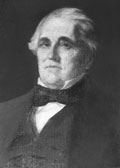 George Rowe, an ardent opponent of abolition, served as our legally required pastor/overseer for the last 5 years before the Civil War It's possible that it was a variety of people. However, in 1857, a self-educated white Fredericksburg resident named George Rowe took over this task on an ongoing basis, becoming the black congregation's legally required pastor/overseer. [1]
George Rowe, an ardent opponent of abolition, served as our legally required pastor/overseer for the last 5 years before the Civil War It's possible that it was a variety of people. However, in 1857, a self-educated white Fredericksburg resident named George Rowe took over this task on an ongoing basis, becoming the black congregation's legally required pastor/overseer. [1]
Rowe lived about a half mile from Shiloh, just up Hanover Street. Born January 1, 1793, he moved to Fredericksburg about 1818 and "immediately identified himself with the business men and business interests of the city." [2] According to newspaper reports after his death, he was known as a person with "a clear head, an honest heart, and an ambitious spirit" and as someone who was "animated by a stern resolve for self-elevation." [3]
Shortly after moving to Fredericksburg, he had professed religion and aligned himself with the racially diverse Baptist church that was just beginning to make the transition from its original location (near the current railroad station) to a new location on the banks of the Rappahannock at what is now 801 Sophia Street. [4]
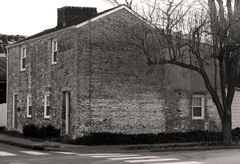 Although it is now a residence, during the 1850s, this building at Charles and Frederick streets served as the private jail for Fredericksburg's principal slave trader at that time, a man named George Aler George Rowe may have been an early member of a racially diverse congregation, but that in no way indicated that he had the slightest doubts about slavery. Not only was he a slave owner, but he had allied himself since at least 1835 with the city's vocal anti-abolition movement, [5] attending meetings and voting to approve long and vigorous resolutions condemning those allegedly false Northern preachers who had "studiously perverted and profanely invoked…the sacred precepts of religion" by seeking the speedy abolition of slavery. [6]
Although it is now a residence, during the 1850s, this building at Charles and Frederick streets served as the private jail for Fredericksburg's principal slave trader at that time, a man named George Aler George Rowe may have been an early member of a racially diverse congregation, but that in no way indicated that he had the slightest doubts about slavery. Not only was he a slave owner, but he had allied himself since at least 1835 with the city's vocal anti-abolition movement, [5] attending meetings and voting to approve long and vigorous resolutions condemning those allegedly false Northern preachers who had "studiously perverted and profanely invoked…the sacred precepts of religion" by seeking the speedy abolition of slavery. [6]
He also served on a twenty-member "vigilance committee" that was appointed to "aid the civil authorities in detecting and bringing to justice the abolitionists, their agents, and emissaries who may be engaged in disseminating their 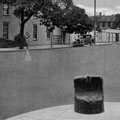 Prior to the Civil War, this auction block (which still stands in silent witness at the corner of Charles and William streets) was well known by early members of Shiloh for it was used for the buying and selling of human beings nefarious publications and prosecuting their incendiary projects" in the Fredericksburg area. [7] This same group urged a vigorous enforcement of the laws, pledging themselves to aid the police in bringing to punishment "the editors and distributors of anti-slavery papers and the preachers and teachers of their doctrines. [8]
Prior to the Civil War, this auction block (which still stands in silent witness at the corner of Charles and William streets) was well known by early members of Shiloh for it was used for the buying and selling of human beings nefarious publications and prosecuting their incendiary projects" in the Fredericksburg area. [7] This same group urged a vigorous enforcement of the laws, pledging themselves to aid the police in bringing to punishment "the editors and distributors of anti-slavery papers and the preachers and teachers of their doctrines. [8]
A newspaper reporter described George Rowe's religious behavior as displaying "the same stern conscientiousness and unremitting attention which had characterized his secular conduct." [9] 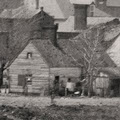 Riverfront homes in Fredericksburg, 1863 At an early date, he was elected as a deacon in the congregation. Later he advanced to the post of an "exhorting" (or preaching) deacon. Finally, at the age of 58 in 1851, he retired from his business activities and was ordained by the Shiloh congregation as a "minister of the gospel." [10]
Riverfront homes in Fredericksburg, 1863 At an early date, he was elected as a deacon in the congregation. Later he advanced to the post of an "exhorting" (or preaching) deacon. Finally, at the age of 58 in 1851, he retired from his business activities and was ordained by the Shiloh congregation as a "minister of the gospel." [10]
As a newly ordained minister, he initially had no fixed charge. He preached or presided in various Baptist churches in the surrounding counties before finally serving for several years as pastor at Spotsylvania's Salem Baptist Church. [11] In 1857, he was appointed as the pastor/overseer of the black segment of his former Fredericksburg congregation, known locally at that time as "the African Baptist Church."
In late November of 1857, the Reverend George Rowe baptized eighteen new members of his congregation in the undoubtedly chilly Rappahannock River. 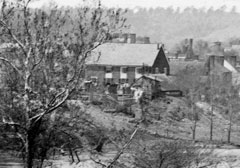 Shiloh's brick building on the Rappahannock River as it looked in March 1863 At that time, he reported to the local press that the congregation’s membership was in excess of 700 individuals. [12]
Shiloh's brick building on the Rappahannock River as it looked in March 1863 At that time, he reported to the local press that the congregation’s membership was in excess of 700 individuals. [12]
Within five years, however, the outbreak of the Civil War had a monumental effect on the congregation. When Union troops arrived in the area in 1862, more than half of the congregation fled the degradation of slavery and racial discrimination that had prevailed in Fredericksburg. city to occupy free areas to the north. At some point in 1862, due to the destruction of the city caused by the Civil War and Rowe’s own failing health, regular Sunday services were discontinued. [13]
Rowe’s resignation as pastor/overseer took effect January 1, 1863, simultaneous with the formal declaration of Emancipation. [14] He died three 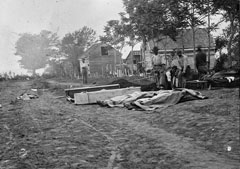 Fredericksburg's African Americans were often used to bury the diseased and partially decomposed bodies of fallen Civil War soldiers years later on January 18, 1866. [15]
Fredericksburg's African Americans were often used to bury the diseased and partially decomposed bodies of fallen Civil War soldiers years later on January 18, 1866. [15]
According to congregational records, during the period of time in which Rowe served as the official pastor/overseer, much of the actual preaching and spiritual direction was provided by the congregation’s own black deacons. In fact, one of those deacons, the Reverend Armistead Walker, is described in early documents as “one of the first ordained colored ministers” in Virginia. [16] According to a letter written on December 7, 1855, held in the archives of the James Monroe Museum and Memorial Library in Fredericksburg, Armistead Walker and George Rowe shared the pastoral duties at Shiloh. [17]
[Click here to read a broader overview of the history of Shiloh Baptist Church (Old Site) in Fredericksburg, Virginia]
Source notes
[1] Fredericksburg, Virginia: The Fredericksburg Ledger, January 26, 1866 (page 3, column 2).
[2] Fredericksburg, Virginia: The Fredericksburg Ledger, January 26, 1866 (page 3, column 2).
[3] Fredericksburg, Virginia: The Fredericksburg Ledger, January 26, 1866 (page 3, column 2).
[4] Fredericksburg, Virginia: The Fredericksburg Ledger, January 26, 1866 (page 3, column 2).
[5] Fredericksburg, Virginia: The Political Arena, September 22, 1935 (page 2).
[6] Fredericksburg, Virginia: The Virginia Herald, September 23, 1935 (page 3, columns 3–5).
[7] Fredericksburg, Virginia: The Virginia Herald, September 23, 1935 (page 3, columns 3–5).
[8] Fredericksburg, Virginia: The Virginia Herald, September 23, 1935 (page 3, columns 3–5).
[9] Fredericksburg, Virginia: The Fredericksburg Ledger, January 26, 1866 (page 3, column 2).
[10] Fredericksburg, Virginia: The Fredericksburg Ledger, January 26, 1866 (page 3, column 2).
[11] Fredericksburg, Virginia: The Fredericksburg Ledger, January 26, 1866 (page 3, column 2).
[12] Fredericksburg, Virginia: The Fredericksburg Ledger, December 1, 1857 (page 2, column 2).
[13] Fredericksburg, Virginia: The Fredericksburg Ledger, January 26, 1866 (page 3, column 2).
[14] Ruth Coder Fitzgerald, A Different Story: A Black History of Fredericksburg, Stafford, and Spotsylvania, Virginia ([City not specified], Unicorn, 1979), 77.
[15] Oscar Darter, The History of Fredericksburg Baptist Church, Fredericksburg, Virginia (Richmond, Virginia: [publisher not stated], 1960), 81.
[16] John C. Diamond, Jubilee Jottings (Fredericksburg, Virginia: Shiloh Baptist Church [Old Site], 1914, only known copy in the archive files of Shiloh Baptist Church [Old Site]); and Brooks-Higgonbotham, "From Strength to Strength: The History of Shiloh Baptist Church of Washington, D.C."
[17] Letter from John Minor to Mary Minor Blackford, written in Fredericksburg, December 7, 1855, cited by Fitzgerald, A Different Story, 77.
Note: Numbers in brackets, such as [1], refer to numbered source notes that can be found at the bottom of this page.